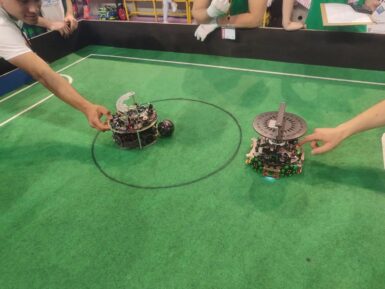
Arduino PLC Starter Kit
Plug into the future of industrial automation with the PLC Starter Kit, designed to bridge between theory and practice, closing the gap in current PLC education and preparing students for real-world challenges.
Overview
Programmable Logic Controller (PLC) technology is vital for industrial automation, but gaps still exist between current PLC education and industry. To cultivate a robust industrial workforce, Arduino introduces a dedicated educational kit - Arduino PLC Starter Kit.
With this kit, you get 20+ hours of lessons with the Explore PLC course. Your students can learn about Programmable Logic Controllers, Modbus RS-485 communications, and integration with industrial simulated systems, among other comprehensive topics.
There’s also support for five PLC programming languages, which means you can program the kit effortlessly using the Arduino PLC IDE. This user-friendly environment simplifies PLC programming for both you and your students. Choose from any of the five programming languages defined by the IEC 61131-3 standard (Ladder, Functional Block Diagram, Structured Text, Sequential Function Chart, or Instruction List) to swiftly code PLC applications or port existing ones to Arduino Opta.
Additionally, the Arduino Opta WiFi can be programmed and integrated into an industrial automation system with our powerful IDE 2. The Arduino IDE 2 is a huge improvement on our classic IDE, with increased performance, improved user interface, and many new features, such as autocompletion, a built-in debugger and syncing sketches with Cloud.
Cloud-ready hardware
The PLC Starter Kit integrates seamlessly with Arduino Cloud services for IoT projects, enabling remote control functionalities for both classroom and real-world scenarios. This is our simplest and low-code way to get started with connected projects.
All hardware provided with the kit is also fully documented in our Arduino Docs page, where hundreds of tutorials, datasheets, guides and technical documentation are published.
Key benefits include:
- Pro industrial automation with reliability and power for complex projects
- Learning content that aligns with the industrial automation curriculum
- Programming that is easy, approachable, and efficient
- Dive straight into practical applications with Arduino's signature ease-of-use, flexibility, and a vast library of software
Course: Explore PLC
With 20 hours of projects and many more tutorials, you have everything you need to teach programmable logic control in your classroom.
Projects include getting started, an introduction to the software, PLC history, communication protocols, digital input simulator learning, networks, and counting - all accessed through one easy-to-use portal connected to the Arduino Cloud.
Need help?
Check the Arduino Forum for questions about the Arduino Language, or how to make your own Projects with Arduino. You can also find out more about Arduino Cloud for Schools here.
If you need any help with your product, please get in touch with the official Arduino User Support as explained in our Contact Us page.
Tech specs
| Arduino Opta WiFi |
|
| Arduino DIN Simul8 |
|
| Arduino DIN Celsius |
|
| Other |
|
| Programming languages |
|
Conformities
Resources for Safety and Products
Manufacturer Information
The production information includes the address and related details of the product manufacturer.
Arduino S.r.l.
Via Andrea Appiani, 25
Monza, MB, IT, 20900
https://www.arduino.cc/
Responsible Person in the EU
An EU-based economic operator who ensures the product's compliance with the required regulations.
Arduino S.r.l.
Via Andrea Appiani, 25
Monza, MB, IT, 20900
Phone: +39 0113157477
Email: support@arduino.cc
Documentation
Arduino Opta WiFi
Pinout Diagram
Download the full Pinout diagram as PDF here.
Arduino DIN Simul8
Arduino DIN Celsius
Get Inspired

Learn to set up an Arduino Nano RP2040 Connect to use MicroPython.

Team Ikaro is a vibrant group of high school students from the Pacinotti Archimede Institute in Rome, sharing a strong passion for electronics and turning heads in the world of robotics! Specializing in Soccer Lightweight games (where robot-soccer players compete to score goals on a miniature field), they clinched the first place at the Romecup 2024 and won Italy’s national Robocup in Verbania earlier this year – earning the right to compete in the world championships in Eindhoven, where they placed third in the SuperTeam competition. The brains behind the bots Utilizing the versatile Arduino Nano RP2040 Connect, the team has crafted highly efficient robots that feature ultrasound sensors, PCB boards, a camera, four motors, a solenoid kicker and omni-directional wheels, all meticulously assembled in the school’s FabLab. Mentored by professor Paolo Torda, Team Ikaro exemplifies the spirit of innovation and teamwork bringing together three talented students: Francesco D’Angelo, the team leader, focuses on system design and mechanics; Flavio Crocicchia, the software developer, ensures the robots’ brains are as sharp as possible; Lorenzo Addario specializes in camera software, making sure the robots can “see” and react swiftly on the field. Their combined efforts have led to a seamless integration of hardware and software, and established a foundation of passion and ambition for future success in their careers. Future goals After their first taste of global competition, Team Ikaro is determined to continue refining their robots, leveraging every bit of knowledge and experience they gain – whether in the classroom, lab, or live challenges. At Arduino, we are proud to sponsor such brilliant young minds and look forward to seeing what they will accomplish next!














